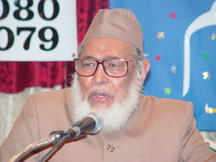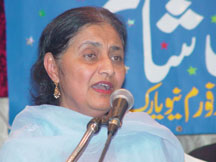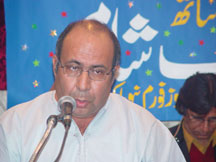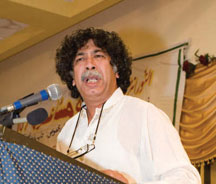Arts
For the Love of Urdu poetry

Mushairas in the U.S. evoke feelings of celebration, nostalgia and love for their roots and culture in a foreign land.
|
Mushairas have been an identifying characteristic of the culture of South Asia for generations. Call it self-expression or freedom to invoke multi-hued themes, mushairas allow poets to dive into the depths of their thought and emerge with Urdu couplets that strike a chord with listeners worldwide. Originating from the shores of India and Pakistan, mushairas are establishing a firm identity in the land of Stars and Stripes too.
The seed of the mushaira tradition in the United States was planted by the Aligarh Alumni Association, which today in collaboration with Urdu Markaz International of Los Angeles, has made mushairas an integral part of the cultural life of the Urdu/Hindi speaking communities in North America. Dr A Abdullah, chairman, of board of trustees of the alumni’s Washington, D.C. chapter, recalls that the U.S. tradition started with Urdu poets getting together in homes to recite verses to each other as a form of entertainment after an evening meal and dessert. In 1975, the alumni association, organized the first mushaira in Washington, D.C. Today mushairas are held in virtually every metropolitan city in the United States, including Atlanta, Boston, San Antonio, Chicago, Washington, New York, Birmingham (Alabama), Houston, Cleveland, Detroit, Phoenix, Los Angeles, Denver, San Francisco, Cincinnati, Little Rock and New Jersey. Often poets from Canada, Europe, England, Pakistan, India and Saudi Arabia join the events.
Mushairas have managed to evoke the poet in immigrants. With the expansion of the population and Urdu media, Abdullah says, “A whole Urdu environment was created by mushairas.” Compared to almost 6-7 hours of non-stop ticketless mushairas in India, the U.S. events, which are priced and held in auditoriums, last 4-5 hours with a break after two hours. Abdullah says the early mushaira audience was sophisticated and enjoyed serious themes, but now it wants entertainment and humor too. Typically 12-15 poets are invited for a mushaira with 4-5 poets representing India and Pakistan. The audience, typically middle aged or elderly, listens with rapt attention, clapping whenever their emotion is stirred by some Urdu sher (couplet).
Poetess Naiyar Jahan, founder of Urdu Markaz International, who resides in Los Angeles, has been organizing mushairas since 1987. “For each mushaira in Los Angeles,” she says, “we have to book a large auditorium as almost 800-1,200 people attend it,” both from India and Pakistan. The mushairas start around 8-9 pm and continue till 1 am. There is no sloganeering or hooting and the listeners clap to express their appreciation for a poet, instead of verbal praise, which is the norm in mushairas in India and Pakistan, she says. “Think of any big shayar (poet) in India or Pakistan and he would have taken part in our mushairas. Though well known poets have graced our mushairas, we have also introduced new poets and there are many who have been invited by us a number of times.”
A major change since mushairas first started in U.S. cities is that poets are using simpler Urdu to broaden their appeal. Her experience with Los Angeles mushaira audience, Naiyar says, is that if they don’t like a poet, they are silent. She is often pained that some well known poets almost beg the audience to appreciate their poetry. Her own poetry revolves around life in America and divorces. The eminent Indian poet Waseem Barelvi began attending U.S. mushairas in 1988. He has made nine visits to North American cities, including New York, Washington and Chicago. The Urdu community in North America, he says, comprises of intellectuals like doctors and engineers who came to America for a better lifestyle. Once that need was met, they wanted to satiate their thirst for their own culture, which they had left behind.
“When people from India and Pakistan came to an alien environment they wanted to remain connected to their roots and religion. Here mushairas have helped people remain in touch with their mother tongue and even propagate Urdu education.” He praised Hindustani shayari for its ability to convey deep thoughts in simple words. “In America, the mushaira audience wants to identify with the issues that they left behind in their countries and use of simpler Urdu by poets, instead of the difficult Arabic-and-Persian-mixed Urdu has gone a long way in establishing this connection.” Another well known poet from India, Manzar Bhopali, who is a regular on the US mushaira circuit, says that he came to America in 1991 for the first time. With almost 60-70 Urdu newspapers and 100-200 Urdu books published in the United States, he , there is continuing love for the language and the younger generation of immigrants is getting attracted to Urdu.
Bhopali says almost 150-200 mushairas are organized annually in different U.S. cities now. Even in smaller cities, the audience can be almost 150-200 strong, with some people driving from surrounding cities. Bhopali adds that a U.S. mushaira audience wants good shayari and the topic is irrelevant, although political issues tend to be less popular/ Another poet, New York-based Khalid Irfan has been participating in mushairas since 1996. He says that though most people in the audience are knowledgeable of mushairas, many listeners are there just because it is an Urdu event. “Such people might not know much about mushairas, but they love being there.” He believes that Urdu lovers in America have created a distinct identity in an English millieu. Many first generation Indians and Pakistanis had been attending mushairas in their home country. Says Irfan, “After coming to US, they wanted mushairas here too and became delighted when they came to know about their healthy existence here.”
|






